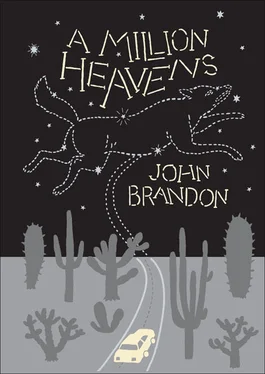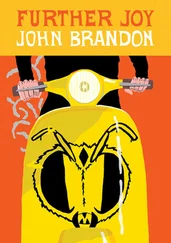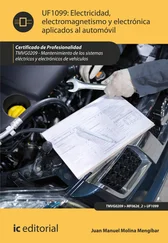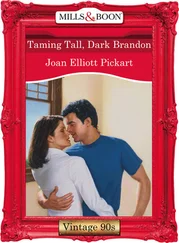Gee and Soren’s father ate, and once again it was the best food he’d ever tasted. It was better than the food at that chef’s house and better than the raw fish. It was absurdly spicy, but somehow he wanted to eat it faster and faster. Gee watched him scarf it down and then gave him a tour of the house. She showed Soren’s father the little loft where she worked on her memoir. She had her computer set up where she could talk into it and her words appeared on the screen. She said to the computer, “Tonight will never make the book. Nobody wants to read about other people being happy,” and the words blinked right up.
To Soren’s father’s surprise, dessert was a pair of Klondike bars. He and Gee sat under the skylight with the night above them, the stars tiny and evenly scattered, and Gee, as she often did, began questioning Soren’s father in a tone meant to challenge him, to steel him. She’d had quite a bit of white wine.
“Your son might not know you when he wakes up,” she said. “You might be strangers, making first impressions on one another.”
“Oh, he’ll know me,” said Soren’s father.
“What if he wakes up when he’s thirty?”
“I’ll be old, but he’ll know me.”
“You’ll be alive when the coma breaks,” Gee said. “That much I can feel. You’ll be around to welcome him back.”
“That’s right. There I’ll be, in my wheelchair.”
“You’ll remember me that day. You’ll think of me when you get your son back.”
“Where are you planning on being?”
“I’m planning on being with you,” Gee said. “That’s how I know I won’t be. My plans never work out.”
Soren’s father itched his jowl. He was still holding the wrapper from the Klondike bar and he crumpled it small and rested it on the end table.
“I’d like for you to come up and see him,” he said. “I’d like to invite you up to his room.”
Gee picked up a heavy ink pen and rolled it in her fingers. “When I pursued you, I didn’t think I’d be successful.”
“Well, I’m easy,” said Soren’s father. “I’d hang around with anybody.”
Gee put the pen down and moved her hand toward Soren’s father. She stopped short of touching his arm, and he did the least he could, which was to reach out and meet her halfway.
It was one of those winter days that, from indoors, appears to be a summer day. He was eating a can of nuts as slowly as he could. In front of him, on his desk, was a letter from Ran, the leader of that church that was considering Lofte. Ran was pleased to inform Mayor Cabrera that the decision-making process wasn’t far behind schedule. They were hoping to wrap things up in March. The church’s taxes were complicated and would tie Ran up for the next few weeks. A couple divorces within the church had to be settled. But March, for sure.
Mayor Cabrera had thought he was going to know Ran’s decision before the town council meeting, but it looked like he would not. This would be an unpleasant meeting. Nothing would be revealed that Mayor Cabrera didn’t know, likely nothing the other four town council members hadn’t sensed, but it was different when you saw it in numbers on paper, when you saw it with other people and had to look at those other people.
Mayor Cabrera ground a hazelnut with his molars, looking vacantly out the lobby windows. He picked Ran’s letter up and held it in front of his face. Ran had given Mayor Cabrera homework. He’d asked Mayor Cabrera to answer a single question for him, to answer the question however he saw fit, to write the answer down and mail it back to him. He’d enclosed an addressed envelope, with postage. Iowa.
Mayor Cabrera watched the teenagers spill into the parking lot, disconsolate like only teenagers could be. The Javelina had enjoyed a decent night — the usual loners, an old couple, and then this gaggle of youngsters. There were twenty of them and they’d split themselves between five rooms. Mayor Cabrera always hesitated to rent rooms to teenagers, but he could tell the moment he’d laid eyes upon this group that they would not be rowdy. Upon arrival, they’d milled about in front of the hotel like cattle, their eyes somber. A boy had broken their ranks and come into the office to rent the rooms. He’d explained that they’d driven nine hours to attend a concert in Albuquerque, only to hear on the radio, an hour from their destination, that the concert had been cancelled. The band was from Croatia and they hated touring. They would never come back to the States. This had been it. This had been the teenagers’ chance to see them. Last night, about eleven, Mayor Cabrera had walked by their rooms and he hadn’t heard a peep.
And here they were again, filing back into their caravan of beat-up SUV’s, each teenager with one plain bag. The same boy approached the office. He wore canvas shoes and a diving watch. He came in and gave Mayor Cabrera the keys and settled the bill. Mayor Cabrera offered him some nuts and he turned them down. He extended his arm for a handshake and Mayor Cabrera went along with this. The boy didn’t seem ready to leave. He turned to the side and looked out the windows.
“It’s no big deal,” he said, embarrassed, aware that he and his friends were being dramatic. “There will be other concerts.”
“Sure there will.”
“We all saved up for the tickets and gas money and the hotel and everything.”
“I see,” said Mayor Cabrera.
“We were singing their songs the whole way here. No one else at our school has even heard of them.”
Mayor Cabrera exhaled.
“It’s still an adventure, right?” The boy laughed falsely.
“Let me ask you something,” Mayor Cabrera said. “Someone asked me this question and I need an answer: Where do we all go wrong?”
The boy looked out at his friends. He repeated the question under his breath, turning a dial on his watch. “Thinking that because you want something and it’s a reasonable thing to want and you make proper preparations and you deserve the thing, that you’re going to get it.”
Mayor Cabrera pushed aside his can of nuts and rested his elbows on his desk. “That’s pretty good,” he said. “That’s not bad.”
Mayor Cabrera watched the boy shuffle back outside, the door dinging as it closed behind him. Mayor Cabrera had never, as a young man, wanted anything. He’d never been as crushed about anything, as a youngster, as these young people here. He’d never made preparations. He’d glided through the years blindly and then lucked into a better life than he’d known existed, his life with Tam. That life had been taken away. Now Mayor Cabrera distracted himself, and when he wasn’t distracted he sulked. He’d lost Tam and it was his own fault that along with her he’d lost his sister-in-law and his niece. He was still sulking. He was shuffling around in the hotel parking lot of his life.
Mayor Cabrera understood that he could not pursue Dana, if he was indeed going to pursue Dana, until he made things right with his family. Dana was a woman Mayor Cabrera had fallen in love with, not a quick fix for the ills of his life. He didn’t want to use her to patch over holes he’d been allowing to widen for over a decade. Dana would make his days ornate, but at present his life had no foundation. He was as much a drifter as any of the poor dusty souls that bunked down in the motel for a night, cheap whisky in tow, and then disappeared the next day just before checkout time.
Mayor Cabrera hung an OUT TO LUNCH sign on the lobby door. He went to his car, passing the sad teenagers, and pulled out of the lot. He drove to the feed store and got what he needed from inside, waving a quick hello to the owner but keeping moving, and then he drove across town at exactly the speed limit and parked along the curb in front of his sister-in-law’s house. He rolled up the windows for no reason. His sister-in-law’s mailbox was leaning to one side in a way that seemed precarious. Factions of weeds were jutting up all throughout the yard, looking like scorched bouquets. Part of Mayor Cabrera was afraid to go inside and face his sister-in-law, but now that he’d committed to doing it he could already feel his shame dissipating. The shame wasn’t from making a mistake, it was from lacking the fortitude to fix it.
Читать дальше












